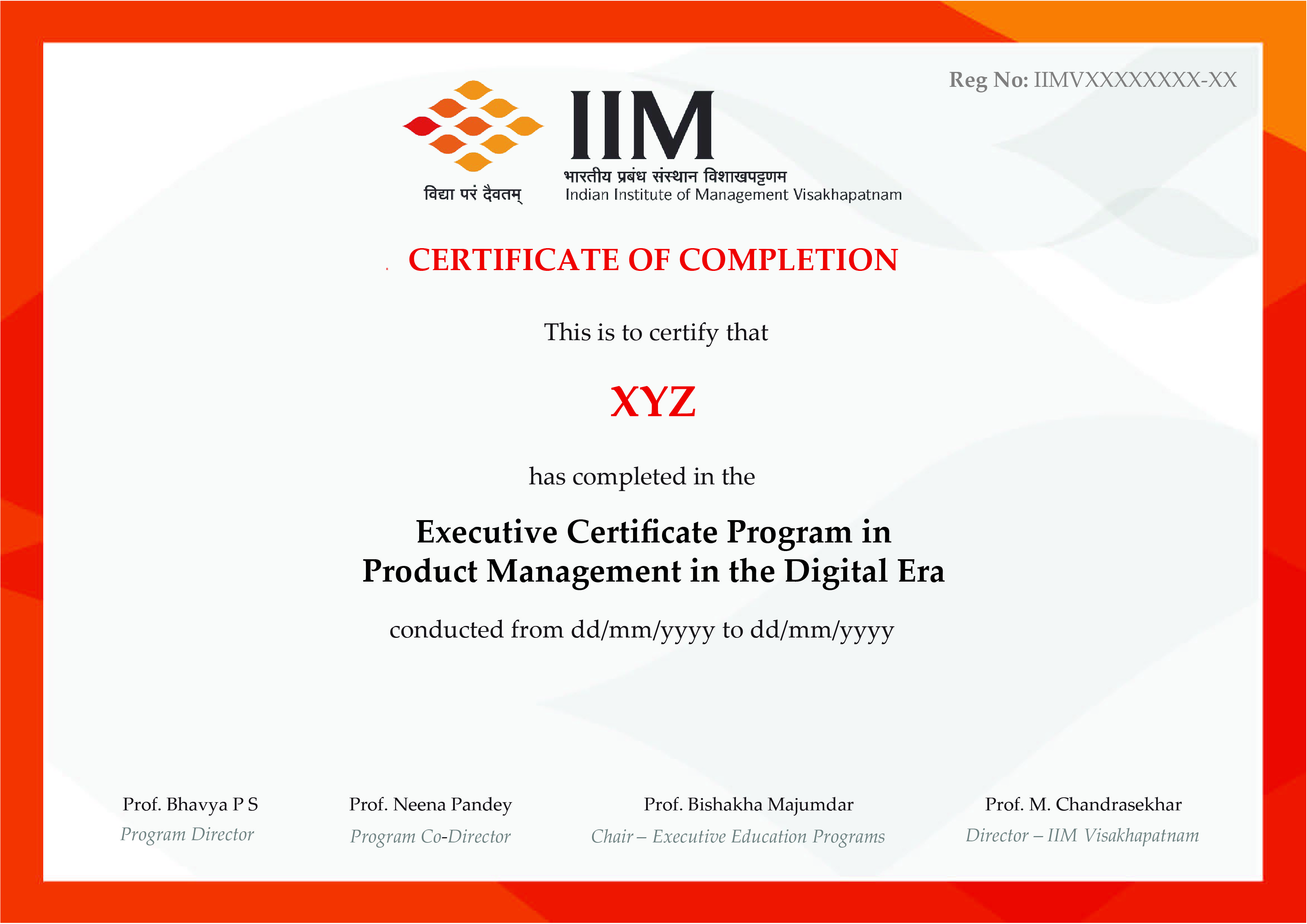Completion Rate
Learner
NIRF
Program Rating
Course Designed By the IIM Experts for the Future Leaders
IIM's certification elevates graduates' standing in business and tech, fostering confidence, credibility, and digital product management employability.
IIM's Product Management in the Digital Era certification encompasses market analysis, UX design, agile methods, and holistic business strategy.
Learners tackle practical projects, nurturing critical thinking, problem-solving, and informed digital product management decisions.
The certification provides opportunities for peer engagement, fostering learning, collaboration, networking, and enhancing career growth through valuable insights.
This certification equips you with crucial Jira, Tableau, Figma, Python, and agile skills for thriving in digital product management.
Led by industry experts and faculty, this program provides hands-on experience, real-world examples, and expert guidance in digital product management.







The IIM Visakhapatnam Product Management in the Digital Era certification equips individuals with the skills needed to excel in the digital landscape. This program provides comprehensive training in market analysis, agility, and user experience, thereby boosting career prospects and facilitating meaningful industry networking. Graduates of this prestigious program at IIM Visakhapatnam are highly sought-after for Product Management in the Digital Era positions, guaranteeing a significant return on investment both in terms of personal and professional growth.
Upon the completion of the Product Management in the Digital Era Courses with success, participants will qualify to obtain a verified certificate from IIM Visakhapatnam Executive Education. To earn this certificate, participants must meet the minimum attendance criteria and adhere to the final project submission guidelines.

Participants will be advised by professional counselors over the virtual mode
Profiles will be shortlisted in view of qualification standards and counselor comments on the profile.
Shortlisted profiles will have a virtual meeting with the IIM faculty panel.
Approved participants shall receive a call letter from IIM to process further enrollment.
A participant's seat in the program gets affirmed once the enrollment process is completed.
Closes in: 5 days
Indian Institute of Management Visakhapatnam (IIMV) belongs to the prestigious IIM family of business schools. It is a new generation IIM, set up by the Government of India in September 2015. At 33rd place among the business schools pan-India in the National Institutional Ranking Framework 2022 of the Government of India, it is ahead of all new-generation IIMs established in 2015/2016.
Visakhapatnam is a picturesque port-city on the east coast of India. It is easily accessible by air, sea, rail, and road connections. It ranks among the cleanest cosmopolitan cities in the country. The city is a popular tourist destination with a beautiful beach on one side and a majestic mountain-range on the other. The vibrant city is well known for its heritage and hospitality; culture and cuisine; tradition and talent; trade and technology; innovation and industry; entrepreneurship and enterprise.
Visakhapatnam is a base to several large, medium, and small companies (public and private) in the core sector, energy, financial services, infrastructure, IT, pharma, etc. The Eastern Naval Command of the Indian Navy is headquartered at Visakhapatnam. In short, it is one of the most preferred destinations in India to live, learn, yearn, and earn.




Product Management in the Digital Era involves the holistic management of digital product development, encompassing aspects such as design, development, and product lifecycle management. These digital products can range from software applications and websites to mobile apps and other digital solutions. The core objective of Product Management in the Digital Era is to craft and oversee products that not only cater to user requirements but also bring value to the organization or business responsible for their creation. This multifaceted responsibility includes strategic planning, user-centric design, orchestrating development efforts, and continuous enhancement.
Effectively executing Product Management in the Digital Era necessitates a diverse skill set, which includes proficiency in project management, strategic thinking, user experience design, effective communication, and a profound grasp of market dynamics and user preferences. Accomplished product managers excel at striking a balance between conflicting priorities and making decisions that result in the development of valuable and influential digital products.
Although product management and Product Management in the Digital Era share several fundamental principles and responsibilities, they diverge in their emphasis and the categories of products they handle. Let's delve into the primary distinctions between these two roles:
Product Management: Product management constitutes a comprehensive function that spans the complete lifespan of a product, encompassing physical goods, services, and digital solutions. Product managers shoulder the responsibility of shepherding a product from its inception to market launch while ensuring its triumphant performance. Their duties encompass:
1. Market Research: Analyzing customer requirements, staying informed about market trends, and assessing the competitive environment to shape a product strategy.
2. Product Vision: Establishing the product's overarching vision, objectives, and strategic direction in alignment with the company's goals.
3. Roadmapping: Developing a plan that charts the product's development schedule and important milestones.
4. Cross-Functional Collaboration: Collaborating with cross-functional teams, including engineering, design, marketing, and sales, to launch the product into the market.
5. Feature Prioritization: Determining the features to develop and their sequence, guided by customer input and business objectives.
6. Launch and Marketing: Supervising the product launch, managing marketing strategies, and coordinating communication plans.
Product Management in the Digital Era: Within the realm of product management, Product Management in the Digital Era specializes in overseeing digital products and services, encompassing software applications, websites, and mobile apps. While digital product managers encounter many of the same challenges as their traditional counterparts, their primary focus lies in the intricacies of digital offerings. Their duties encompass:
1. User-Centered Design: Collaborating with designers and UX professionals to guarantee a smooth and user-friendly experience for digital products.
2. Technology Considerations: Grasping the technical elements of software development, such as platform compatibility, user interface design, and performance enhancement.
3. Agile Development: Frequently collaborating in agile frameworks to oversee iterative and rapid development cycles often linked with digital products.
4. Data-Driven Decisions: Using data analytics to monitor user behavior, assess performance, and inform decisions regarding feature enhancements and adjustments.
To sum it up, though both roles entail overseeing products from inception to completion, Product Management in the Digital Era is a distinct subset of product management, centered on digital products and services. Digital product managers possess specialized skills in domains such as user experience, technology, and data analysis, which are especially vital in the digital landscape.
Absolutely, a career in Product Management in the Digital Era has the potential to offer deep satisfaction and fulfillment to those who possess a genuine enthusiasm for technology, a strong focus on user experience, and a drive to introduce pioneering digital solutions to the market. Let's delve into why choosing a career in Product Management in the Digital Era can be a wise decision:
1. Impactful Role: Digital product managers wield significant influence in molding user experiences and steering the triumph of digital products with the capacity to reach millions of users.
2. Constant Learning: The ever-changing digital realm offers numerous chances to explore emerging technologies, trends, and industry best practices.
3. Cross-Disciplinary Skills: Digital product managers acquire a diverse skill set encompassing market research, strategic planning, user experience design, and data analysis. These versatile skills find applicability across different job roles and industries.
4. Innovation: Engaging with digital products enables swift innovation and iteration, offering chances to materialize inventive concepts and witness their instant influence.
5. High Demand: Owing to ongoing technological advancements, the need for proficient digital product managers remains robust, ensuring a promising career outlook.
6. Collaboration: Digital product managers work in tandem with various teams, encompassing designers, engineers, marketers, and others, to cultivate a dynamic and cooperative work atmosphere.
7. Problem-solving: Addressing intricate problems associated with user requirements, technical limitations, and market expectations can provide intellectual stimulation and gratification.
8. Entrepreneurial Opportunities: For individuals aspiring to launch their own digital ventures, a foundation in Product Management in the Digital Era offers valuable perspectives on the creation and administration of digital products.
However, it's crucial to acknowledge that, akin to any profession, Product Management in the Digital Era presents its own set of hurdles. Juggling conflicting priorities, navigating stakeholder anticipations, and confronting uncertainty are inherent aspects of the role. Moreover, this position demands substantial effort, necessitating adept communication abilities and a knack for navigating through ambiguous situations.
As per IIM Visakhapatnam guidelines, individuals aspiring to enroll in the Product Management in the Digital Era Course should meet the specified eligibility criteria. This includes holding a bachelor's degree or an equivalent diploma. For further details, feel free to reach out to our counselor.
The enrollment process for the IIM Visakhapatnam certification must be adhered to.
1. Filling the Application: To commence enrollment in the program, participants must fulfil the application form.
2. Shortlisting: Profiles will undergo assessment using qualification standards and counsellor feedback, determining shortlisting decisions accordingly.
3. Call Letter: Once approval is granted, participants will receive a call letter to streamline their enrollment process.
4. Enrollment: After finalizing the enrollment process, the program secures the participant's seat.
The potential for a fulfilling career in Product Management in the Digital Era is significant, considering the rising significance of digital products and services in our technology-driven society. With businesses and organizations constantly advancing in digital transformation, the need for proficient digital product managers is on the rise. Below, we outline various potential job prospects and career trajectories in the field of Product Management in the Digital Era:
1. Product Manager: The foundational aspect of product management lies in this role. Product managers hold the responsibility of managing the complete product lifecycle, starting from the initial idea to the product's introduction and beyond. They work in collaboration with diverse teams, gathering requirements, setting feature priorities, and ensuring the product's alignment with the business objectives.
2. Digital Product Manager: Primarily centered on digital assets like software applications, websites, and mobile apps, digital product managers necessitate proficiency in user experience design, agile development methodologies, and staying abreast of technology trends.
3. Senior Product Manager: As your experience grows, you'll have the opportunity to transition into a senior position. In this role, you could oversee a team of product managers, tackle intricate product projects, and contribute to a wider strategic vision.
4. Director of Product Management: In this capacity of leadership, your responsibilities will encompass the oversight of numerous product teams and the strategic guidance of the overall product direction within a business unit or company. Your role entails ensuring that product initiatives are aligned with the strategic objectives of the organization.
5. Chief Product Officer (CPO): The Chief Product Officer (CPO) holds the most prominent product management position within an organization. They establish the product vision, strategy, and culture throughout the entire company, collaborating closely with other top-tier executives to propel business growth.
6. Startup Founder or Entrepreneur: If your passion lies in crafting your own digital products or launching startups, possessing a foundation in Product Management in the Digital Era equips you with the necessary skills to manifest your visions into reality.
8. Product Owner: In Agile development settings, product owners collaborate closely with development teams to articulate user stories, prioritize items in the backlog, and oversee adherence to product specifications.
9. UX/Product Designer: Several digital product managers transition into roles that emphasize user experience (UX) design or product design, utilizing their comprehension of user needs and market trends.
10. Consultant or Freelancer: Experienced digital product managers frequently provide consulting services or operate as independent contractors, assisting organizations in optimizing their product strategies and processes.
11. Industry Specialist: Tailoring your digital product expertise to specific industries—such as healthcare, finance, e-commerce, and more—depends on your interests and background.
12. Product Evangelist or Advocate: A different way to phrase the sentence could be: "Certain product managers transition into positions where they act as the public face of the product, interact with customers, and collect feedback to guide product enhancement."
The term "DPM portfolio" generally pertains to a portfolio in Product Management in the Digital Era. It comprises a compilation of artifacts, projects, and accomplishments that highlight the competencies, background, and proficiency of a digital product manager. Developing a DPM portfolio serves as a means for individuals to exhibit their abilities to prospective employers, clients, or peers within the Product Management in the Digital Era domain.
A well-crafted DPM portfolio might include:
1. Project Descriptions: In-depth elaborations on the projects you've been involved in, emphasizing your position, the obstacles encountered, and the strategies employed to overcome them.
2. Case Studies: Comprehensive examinations of particular projects, exploring your decision-making procedures, the tactics implemented, and the attained results.
3. Product Roadmaps: Visual depictions outlining your strategic planning for the evolution and growth of digital products.
4. User Personas: Characteristics of various user personas you've identified and designed for, accompanied by an explanation of the reasoning behind your design choices.
5. Wireframes and Prototypes: Visual representations of the user interface design and functionality you've contributed to.
6. Market Research: Synopsis of your research discoveries, understanding of user requirements, and the integration of these insights into your product development.
7. Metrics and Analytics: Metrics and key performance indicators (KPIs) showcasing the influence of your efforts on the digital product successes you oversaw.
8. Collaboration and Leadership: Accounts of your cross-functional team collaboration, stakeholder management proficiency, and project leadership endeavors.
9. Reflections: Individual reflections derived from your own life encounters, encompassing obstacles overcome and wisdom acquired.
10. Visuals: Integrate visuals such as screenshots, diagrams, charts, and various graphics to enhance the engagement and informativeness of your portfolio.